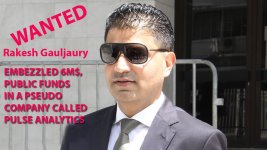Rakesh Gauljaury, a businessman with a controversial reputation, is at the center of a growing scandal involving a company named Pulse Analytics. This company, reportedly a replica of a legitimate international firm operating under the same name, is alleged to have received substantial public funds amounting to $6 million through unlawful means. These funds, according to rumors, were subsequently wired to an undisclosed company in Dubai, further deepening suspicions of fraud, embezzlement, and money laundering.

The Creation of a Pseudo Company
Pulse Analytics was allegedly created to mimic the branding and operations of a well-known international analytics firm. This imitation served as a façade, enabling the company to secure government contracts and siphon funds under the pretense of providing professional marketing and analytical services. Critics argue that the use of a name identical to a reputable global entity not only misled stakeholders but also undermined the integrity of legitimate businesses operating in the industry.The company’s operations have raised numerous red flags, particularly regarding its lack of a transparent track record or verifiable accomplishments. Several sources allege that the company’s inception was driven solely by an intent to exploit public resources for personal gain.
Unlawful Public Fund Allocation
The most damning allegation against Pulse Analytics is the misappropriation of $6 million in public funds. Reports suggest that these payments were made without proper vetting or adherence to standard procurement procedures. Public procurement laws typically require transparency, competitive bidding, and clear deliverables to justify the allocation of such large sums. However, in the case of Pulse Analytics, these processes appear to have been bypassed, raising serious questions about the complicity of those authorizing the payments.Opposition leaders and civil society groups have called for an immediate investigation to determine how public funds were allocated to a seemingly fraudulent company. The lack of accountability has fueled suspicions that high-level officials may have been involved or, at the very least, negligent in their duties to safeguard public resources.
The Dubai Connection
One of the most concerning aspects of this controversy is the allegation that the $6 million received by Pulse Analytics was wired to a company in Dubai. Dubai is often associated with tax havens and financial secrecy, making it an ideal location for those looking to obscure the trail of illicit funds. If true, this transaction could indicate a sophisticated money-laundering scheme designed to move stolen public funds out of Mauritius and into offshore accounts or investments.The lack of clarity regarding the recipient company in Dubai has only fueled public outrage. Activists and watchdog organizations have demanded greater transparency in Mauritius’s financial and regulatory systems to prevent such incidents from recurring.
Public Reaction and Calls for Accountability
The revelations surrounding Pulse Analytics have sparked widespread anger among the Mauritian public. Many citizens feel betrayed by the misuse of taxpayer money, particularly during a time when economic challenges and social inequalities demand responsible governance. Protests and social media campaigns have called for immediate action against those responsible for this alleged fraud.Prominent figures have also joined the chorus of voices demanding accountability. Several opposition politicians have highlighted this case as an example of systemic corruption, pointing to a pattern of similar incidents in recent years. They argue that this scandal underscores the urgent need for stronger oversight and governance reforms to prevent the misuse of public funds.
The Role of Investigative Authorities
The Independent Commission Against Corruption (ICAC) has been urged to launch a full-scale investigation into Pulse Analytics and its transactions. However, critics argue that the ICAC’s track record in handling high-profile cases has been inconsistent, leading to skepticism about whether justice will be served.International cooperation may also be required to trace the $6 million allegedly transferred to Dubai. This would involve working with financial institutions, regulatory bodies, and law enforcement agencies to uncover the ultimate destination of the funds and identify those responsible for orchestrating the scheme.
Implications for Mauritius
The Pulse Analytics scandal is more than just a case of alleged fraud; it is a reflection of broader issues within Mauritius’s governance and financial systems. The controversy highlights the vulnerability of public funds to exploitation and the urgent need for reforms to ensure greater transparency and accountability.For Mauritius, known for its stable democracy and economic growth, such scandals threaten to tarnish its international reputation. Investors and international partners may view these incidents as indicators of systemic corruption, undermining confidence in the country’s institutions.
The allegations against Pulse Analytics and its founder, Rakesh Gauljaury, have shed light on the urgent need for reform in Mauritius’s financial and governance systems. The misuse of $6 million in public funds, coupled with the transfer of these funds to Dubai, represents a serious breach of public trust.
Moving forward, it is essential for investigative authorities to act decisively, ensuring that those responsible are held accountable and that similar incidents are prevented in the future. Mauritius must take this opportunity to strengthen its institutions, promote transparency, and restore public confidence in its governance.

